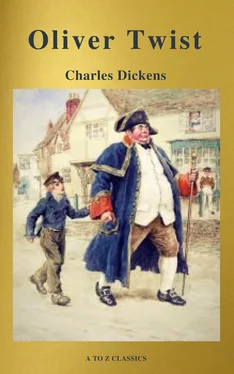‘Meanwhile, the young prince, effectually disguised, wandered on foot through his father’s dominions, cheered and supported in all his hardships by sweet thoughts of the Athenian maid, who was the innocent cause of his weary trials. One day he stopped to rest in a country village; and seeing that there were gay dances going forward on the green, and gay faces passing to and fro, ventured to inquire of a reveller who stood near him, the reason for this rejoicing.
‘“Know you not, O stranger,” was the reply, “of the recent proclamation of our gracious king?”
‘“Proclamation! No. What proclamation?” rejoined the prince—for he had travelled along the by and little–frequented ways, and knew nothing of what had passed upon the public roads, such as they were.
‘“Why,” replied the peasant, “the foreign lady that our prince wished to wed, is married to a foreign noble of her own country, and the king proclaims the fact, and a great public festival besides; for now, of course, Prince Bladud will come back and marry the lady his father chose, who they say is as beautiful as the noonday sun. Your health, sir. God save the king!”
‘The prince remained to hear no more. He fled from the spot, and plunged into the thickest recesses of a neighbouring wood. On, on, he wandered, night and day; beneath the blazing sun, and the cold pale moon; through the dry heat of noon, and the damp cold of night; in the gray light of morn, and the red glare of eve. So heedless was he of time or object, that being bound for Athens, he wandered as far out of his way as Bath.
‘There was no city where Bath stands, then. There was no vestige of human habitation, or sign of man’s resort, to bear the name; but there was the same noble country, the same broad expanse of hill and dale, the same beautiful channel stealing on, far away, the same lofty mountains which, like the troubles of life, viewed at a distance, and partially obscured by the bright mist of its morning, lose their ruggedness and asperity, and seem all ease and softness. Moved by the gentle beauty of the scene, the prince sank upon the green turf, and bathed his swollen feet in his tears.
‘“Oh!” said the unhappy Bladud, clasping his hands, and mournfully raising his eyes towards the sky, “would that my wanderings might end here! Would that these grateful tears with which I now mourn hope misplaced, and love despised, might flow in peace for ever!”
‘The wish was heard. It was in the time of the heathen deities, who used occasionally to take people at their words, with a promptness, in some cases, extremely awkward. The ground opened beneath the prince’s feet; he sank into the chasm; and instantaneously it closed upon his head for ever, save where his hot tears welled up through the earth, and where they have continued to gush forth ever since.
‘It is observable that, to this day, large numbers of elderly ladies and gentlemen who have been disappointed in procuring partners, and almost as many young ones who are anxious to obtain them, repair annually to Bath to drink the waters, from which they derive much strength and comfort. This is most complimentary to the virtue of Prince Bladud’s tears, and strongly corroborative of the veracity of this legend.’
Mr. Pickwick yawned several times when he had arrived at the end of this little manuscript, carefully refolded, and replaced it in the inkstand drawer, and then, with a countenance expressive of the utmost weariness, lighted his chamber candle, and went upstairs to bed. He stopped at Mr. Dowler’s door, according to custom, and knocked to say good–night.
‘Ah!’ said Dowler, ‘going to bed? I wish I was. Dismal night. Windy; isn’t it?’
‘Very,’ said Mr. Pickwick. ‘Good–night.’
‘Good–night.’
Mr. Pickwick went to his bedchamber, and Mr. Dowler resumed his seat before the fire, in fulfilment of his rash promise to sit up till his wife came home.
There are few things more worrying than sitting up for somebody, especially if that somebody be at a party. You cannot help thinking how quickly the time passes with them, which drags so heavily with you; and the more you think of this, the more your hopes of their speedy arrival decline. Clocks tick so loud, too, when you are sitting up alone, and you seem as if you had an under–garment of cobwebs on. First, something tickles your right knee, and then the same sensation irritates your left. You have no sooner changed your position, than it comes again in the arms; when you have fidgeted your limbs into all sorts of queer shapes, you have a sudden relapse in the nose, which you rub as if to rub it off—as there is no doubt you would, if you could. Eyes, too, are mere personal inconveniences; and the wick of one candle gets an inch and a half long, while you are snuffing the other. These, and various other little nervous annoyances, render sitting up for a length of time after everybody else has gone to bed, anything but a cheerful amusement.
This was just Mr. Dowler’s opinion, as he sat before the fire, and felt honestly indignant with all the inhuman people at the party who were keeping him up. He was not put into better humour either, by the reflection that he had taken it into his head, early in the evening, to think he had got an ache there, and so stopped at home. At length, after several droppings asleep, and fallings forward towards the bars, and catchings backward soon enough to prevent being branded in the face, Mr. Dowler made up his mind that he would throw himself on the bed in the back room and think—not sleep, of course.
‘I’m a heavy sleeper,’ said Mr. Dowler, as he flung himself on the bed. ‘I must keep awake. I suppose I shall hear a knock here. Yes. I thought so. I can hear the watchman. There he goes. Fainter now, though. A little fainter. He’s turning the corner. Ah!’ When Mr. Dowler arrived at this point, he turned the corner at which he had been long hesitating, and fell fast asleep.
Just as the clock struck three, there was blown into the crescent a sedan–chair with Mrs. Dowler inside, borne by one short, fat chairman, and one long, thin one, who had had much ado to keep their bodies perpendicular: to say nothing of the chair. But on that high ground, and in the crescent, which the wind swept round and round as if it were going to tear the paving stones up, its fury was tremendous. They were very glad to set the chair down, and give a good round loud double–knock at the street door.
They waited some time, but nobody came.
‘Servants is in the arms o’ Porpus, I think,’ said the short chairman, warming his hands at the attendant link–boy’s torch.
‘I wish he’d give ’em a squeeze and wake ’em,’ observed the long one.
‘Knock again, will you, if you please,’ cried Mrs. Dowler from the chair. ‘Knock two or three times, if you please.’
The short man was quite willing to get the job over, as soon as possible; so he stood on the step, and gave four or five most startling double–knocks, of eight or ten knocks a–piece, while the long man went into the road, and looked up at the windows for a light.
Nobody came. It was all as silent and dark as ever.
‘Dear me!’ said Mrs. Dowler. ‘You must knock again, if you please.’ ‘There ain’t a bell, is there, ma’am?’ said the short chairman.
‘Yes, there is,’ interposed the link–boy, ‘I’ve been a–ringing at it ever so long.’
‘It’s only a handle,’ said Mrs. Dowler, ‘the wire’s broken.’
‘I wish the servants’ heads wos,’ growled the long man.
‘I must trouble you to knock again, if you please,’ said Mrs. Dowler, with the utmost politeness.
The short man did knock again several times, without producing the smallest effect. The tall man, growing very impatient, then relieved him, and kept on perpetually knocking double–knocks of two loud knocks each, like an insane postman.
Читать дальше












